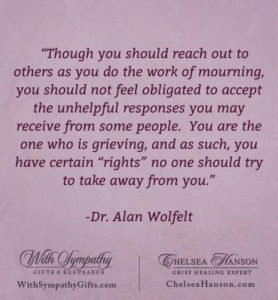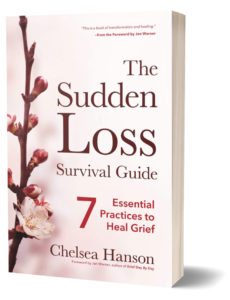Many years ago I heard Dr. Alan Wolfelt talk about tips to cope with grief. Light bulb after light bulb went off for me. I was so inspired by this information that I decided to become a grief educator and open With Sympathy Gifts and Keepsakes. I knew with the proper guidance and support your mourning experience can be better and less painful than going it alone.
Now, more than 20 years after Mom’s death, I continue to share the information I wish I’d had when I was mourning. It’s also the guidance I wish Mom had when my father died when I was a child.
After many years of work, I condensed the most important guidance into my book, How to Heal Your Grief: 7 Essential Practices to Recovering After Sudden Loss. This guidebook will make your experience more bearable after surviving the sudden loss of someone you love and will be released in 2019.
I am glad you are tuning into my blog for inspiration, support and encouragement to heal your grief and support others. Thank you!
Together, we can make the grief healing experience better for everyone!

What Are Your Rights?
The Mourner’s Bill of Rights from Dr. Alan Wolfelt is intended to empower healing and assist decision-making about how others can (or cannot) provide support. These rights are very important to take to heart so you can be an advocate for yourself when grieving.
Below are the 10 tenants:
1. You have the right to experience your own unique grief.
Grief is a natural and necessary experience, and each of us grieves differently. You will not “get over it,” as others mistakenly encourage you to do.
That does not mean you will be stuck in sadness or anger forever; instead, the pain will lessen over time and memories will begin to replace the sorrow.
2. You have the right to talk about your grief.
Talking about your loss will help you heal. Seek out others who will allow you to talk as much as you want and as often as you need. If at times you don’t feel like talking, you also have the right to be silent.
3. You have the right to feel a multitude of emotions.
When your emotions sneak up on you, don’t push them away.
Let them in and feel every ounce because you will experience healing at the deepest level possible. Emotions can be a reminder of just how much your loved one means to you. Remember, it is ok to feel happiness, relief, and joy too.
4. You have the right to be tolerant of physical and emotional limits.
Please don’t expect to do the same amount of activity or work you had done in the past. Your body needs to rest while it is healing. Listen to your mind and body and do not let others persuade you to do unwanted things.
5. You have the right to experience “grief bursts.”
Don’t be apologetic for your feelings or tears. They are a natural part of the process and you have the right to experience them in public or private. Make sure to be an advocate for yourself and communicate with your support system. Let your friends and family know that these emotional outbursts may happen. Advise them that you may need to cry and talk about your feelings when emotions rise.
6. You have the right to make use of ritual.
How to honor and celebrate your loved one is your decision and yours only. Focus on celebrating the life of your loved one in a way that feels right. Rituals and traditions can be used to keep a connection with the deceased. A ritual can be anything that you desire. You can hold a prayer service, write messages on balloons and release them to heaven, or do a charity event in your loved one’s name.
7. You have the right to embrace your spirituality.
Express your spirituality in whatever form that may take, in a way that seems correct to you. If you feel disconnected spiritually, consider time for examination and exploration.
8. You have the right to search for meaning.
The death of your loved one will bring meaning to the rest of your life. When you lose someone everything changes. Your priorities, values and the way you view the world will transform. What mattered before doesn’t matter anymore. It is your choice to search for and choose the meaning you give to the death of your loved one. You will make sense of the chaos of grief in your own way and in your own time.
9. You have the right to treasure your memories.
Memories can help with your sorrow and carry the legacy of your loved one. Embrace the memories as much as you can. Hold on to them. Share them with others.
10. You have the right to move toward your grief and heal.
You will not be back to normal in an instant. Do not let anyone else persuade you to think otherwise. When you lose a loved one, you may be grieving the loss of this person for many years, but you get to decide the process.
Although healing occurs, the sense of physical loss may stay. It’s your unique experience.
Give a copy of the “Mourners Bill of Rights” to the people in your life so they understand how to provide healthy support.

Leave a Reply